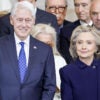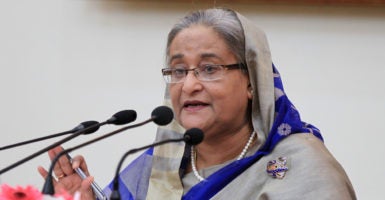Bangladesh just held a national election that produced an overwhelming victory for the incumbent Awami League—but also allegations of rampant voter fraud, intimidation, and corruption.
A large, Muslim-majority democracy situated between India and Myanmar, Bangladesh is the world’s eighth-largest country by population with 170 million people, and it has an outsized impact on South Asian stability and Indian Ocean security.
As such, the results of the Dec. 30 elections should be closely watched in Washington.
Contemporary Bangladeshi politics have been framed by a sharp political rivalry between the ruling Awami League and the principal opposition, the Bangladesh Nationalist Party.
Of the two, the Awami League is seen as the more moderate, pro-Western, pro-India, and pro-market reform, while the Bangladesh Nationalist Party has earned a reputation for making bedfellows with Islamist fundamentalist groups.
To their credit, the Awami League and its leader, Prime Minister Sheikh Hasina, have overseen an impressive run of economic growth since taking power in 2009.
Bangladesh is one of the fastest-growing economies in the world. Gross domestic product growth has averaged more than 6 percent annually for more than a decade and may reach 8 percent in 2018.
That’s despite the fact the country still confronts high levels of corruption and scores poorly on The Heritage Foundation’s Index of Economic Freedom, ranking 128th out of 170 countries and as “mostly unfree.”
In the election, the coalition led by the Awami League was awarded a stunning 287 of 298 seats in parliament, while the opposition Bangladesh Nationalist Party, which led a ruling coalition from 2004 to 2009, won just six seats.
Unlike in the 2014 elections, the Bangladesh Nationalist Party did not boycott the poll outright, but levied a series of reliable complaints about widespread fraud, vote-rigging, intimidation, and violence.
Seventeen people were killed in election-related violence across the county. Ahead of the balloting, the State Department condemned Bangladesh’s refusal to grant credentials for election monitors.
The Bangladesh Nationalist Party claims that more than 100 of its candidates were attacked while campaigning, while thousands of its activists were detained by security forces in the weeks preceding the vote.
The party’s website and Facebook page were also shut down by authorities ahead of the vote. The head of the Bangladesh Nationalist Party, Khaleda Zia, was imprisoned earlier this year on corruption charges.
While suboptimal electoral conditions are not uncommon in developing countries, and the Bangladesh Nationalist Party was widely accused of using similar tactics during its last term in power, the reports are troubling nonetheless.
Those reports follow years of complaints of creeping authoritarianism by the Awami League government, which was widely condemned earlier this year for detaining a prominent journalist who dared to criticize the government in a public interview.
Those trends are unfortunate because, in the foreign policy arena, the Awami League has made some promising strides. The government has taken a tough line against Islamist extremist groups, particularly since the July 2016 terrorist bombing of a Dhaka cafe that claimed 22 lives, the deadliest terrorist attack in the country’s history.
It has generously provided refuge to hundreds of thousands of Rohingya Muslims that have fled genocide conditions in neighboring Myanmar in recent years. It also has significantly improved relations with India, even resolving two long-standing territorial and maritime border disputes with New Delhi in recent years.
Relations with the U.S. also have been strengthening. The two countries signed a counterterrorism cooperation initiative in 2013, and U.S. officials have praised cooperation in that arena.
The two nations currently have a high-level partnership and dialogue on security issues in place. America transferred two Coast Guard cutters to Bangladesh in 2013 and 2015, while the Bangladesh navy has participated in U.S.-led naval training exercises.
Public polling indicates that Bangladesh’s population is one of the most pro-American in the region, and officials in Dhaka are generally enthusiastic about further strengthening ties with the U.S. They are particularly eager to increase bilateral trade, reduce tariffs, and encourage more U.S. investment in the energy and power sectors.
America is already the top importer of Bangladeshi goods (garments account for 80 percent of its exports), and the two have a bilateral investment treaty and double taxation avoidance agreement in place.
All of this suggests a promising future for Bangladesh, but the Awami League must do more to address concerns about its repressive domestic policies, which risk turning international opinion against it and radicalizing opposition groups.
Working in tandem with India and other international partners, the U.S. must encourage further political and rule-of-law reforms, and urge Dhaka to follow proper procedures for addressing electoral-fraud complaints.
If Bangladesh can get its house in order, there can be a bright economic and geopolitical future for Dhaka and Bangladesh-U.S. ties.































